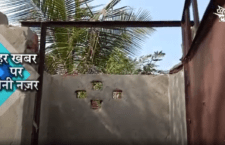With International Women’s History Month coming to a close, Khabar Lahariya’s special report on the Uttar Pradesh government’s Mission Shakti campaign explores the age old and yet current problems in placing the onus of women’s safety from sexual violence on the women themselves, and how the government’s interventionist policies need to include boys and men to actively be a part of the solution.
“We talk about how many women were raped last year, not how many men raped women. We talk about how many girls in a school district were harassed last year, not about how many boys harassed girls. We talk about how many teenage girls in the state of Vermont got pregnant last year, rather than how many boys and men impregnated teenage girls. Even the term ‘violence against women’ is problematic…It’s a bad thing that happens to women, but when you look at that term, ‘violence against women,’ nobody is doing it to them. It just happens to them…Men aren’t even a part of it.” – Quote by Jackson Katz
(Eighty-seven women are raped everyday in India, on average,) On average, 87 women are raped every day in India, according to a 2019 National Crime Records Bureau report. Uttar Pradesh alone averages 163 crimes against women per day, the highest in the country, a dubious distinction it seems to achieve year after year. Echoing the words of American filmmaker and TED speaker Jackson Katz, nowhere is the supposed passivity of men’s violence against women more pronounced than in UP, which keeps rolling out one scheme after another in the interest of promoting “women’s safety”, the latest of them being Mission Shakti.
The Uttar Pradesh government launched ‘Mission Shakti’ programme in 2020 for the security of women in the state, while the second phase of the Safe City Project was also inaugurated recently in Lucknow in the presence of CM Adityanath Yogi. Addressing the program, he said that “the empowerment of women can be taken forward only through education.” Referring to several schemes of the government for the safety, education and self-reliance of women, the Chief Minister said that the government is running several programs to make “women aware of their rights. Until women become aware, they will not be able to take full advantage of the schemes.” While some of the provisions under these schemes like women help desks and counsellors in all police stations, and setting up of dedicated toilets for women (even if they are pink) are surely a step in the right direction if implemented effectively, as far as gender sensitisation goes, it still leaves a lot to be desired when the half of the population that is perpetrating the violence is conveniently left out from these awareness campaigns.
That’s probably why Maya Vishvakarma, a young girl from Ayodhya, is not impressed with these efforts. “The government is just fooling us women with these campaigns. The ones who’re committing these acts of violence against women, the government isn’t saying anything to them. If a man misbehaves with a woman, who out of the two needs actual awareness in that situation? We don’t need to be made aware of the perils of being female, if they really want to spread awareness they should start with the men. Nari Shakti Mission can only be successful if we manage to change men’s mentality towards women.”
Hema Devi, a young girl from Chitrakoot, agrees with Maya wholeheartedly. “Everywhere you look, women are facing oppression. But there is no pressure on boys (to behave).” And Khijra Jamal, from Karvi Chitrakoot, concurs “I think more men are in need of awareness. If they had a better mindset all these awareness campaigns to protect women won’t be needed in the first place. And it’s not just the boys, their families should rethink their mindsets as well. At home, family members always stop the daughters from going out, ostensibly for their own safety. It would be good if they questioned their sons whereabouts as well.”
Mandakini Devi from Chitrakoot breaks down the daily struggles of rural women trying to reclaim public spaces, and wonders when men will be held up to the same standards as women. “There are always rules and strict dos and don’ts for women. Some rules need to be made for men as well. Women are more than capable of taking care of themselves but it’s men who need to change their behaviours. For example, if we travel anywhere by bus, 3-4 men will appear out of nowhere and form a crowd around her, push her and think to themselves, “oh she is alone we can have some fun”, they won’t think of her safety — it is them she needs to be safe from! That’s why we need to work on men’s mentality and behaviour.”
Anupama Srivastava, the women police station in-charge of Chitrakoot, explains that under Mission Shakti, women are provided with a helpline for their safety (181.112 and 1090). These helplines provide information on how to navigate public transport, and how to take care of themselves. She further adds, “I’m not going to lie, we haven’t done any awareness campaigns for young boys and men yet. But in our earlier campaigns, this program was intended for all students – male and female. So the boys would be told not to do ‘galat kaam’, and to respect women and keep a distance.”
RK Patel, the BJP MLA from Chitrakoot, admits the problem of patriarchy and misogyny are deep-rooted in India, and even more acutely in Bundelkhand. “Women have been consistently left behind in our country. If we look at education, the mindset in the society is to educate our girls for (and up till) marriage, and to educate our sons to become officers.”
Feminist activists have long campaigned for gender education to be a part of institutionalised formal and vocational education and for good reason. Earlier this month, to celebrate International Women’s Day, the government also made provisions for “self-defence” and “judo-karate” training for young girls across schools in rural UP. But many of these young girls and women that we spoke to asked the age-old question of why the onus of women’s safety from sexual violence is placed on the women themselves. “The government says we need safety, but from whom? Men? So why aren’t there any schemes for the sensitisation and awareness of men towards extremely gendered nature of sexual violence?”
Our reporter Anita from Ajaygarh, Panna, covered the Mahila Valya Vikas, one of the organisations that ran a self defence campaign from March 8 to March 22, wherein judo-karate was being taught to the young girls at the local school. According to the school authorities, “The aim is to make them self reliant enough to protect themselves in a state of crisis.” Mehak, a young schoolgirl from Chikyana Mohalla told us how they’ve learnt many things here, “like how to protect ourselves, how to retaliate if someone touches us without our permission, koi humein galat iraade se dekh raha hai toh kya karna chahiye [if someone is looking at us with wrong intentions], what to do if someone grabs our hand, and how we can fight back.” And while fighting back is important, Priyanka Pandey, the martial arts trainer at the school, ruefully admits that “to be honest, girls shouldn’t need to learn self defence or martial arts, they should have the full freedom to roam about, move around without the threat of an impending assault. But due to the prevalence of some criminal people, self defence has become more of a necessity for us women.”
With International Women’s History Month coming to a close today, it is vital to remember that the issues of patriarchy, caste-based gender violence, women’s safety and gender equity are systemic and can only be addressed with a long-term, institutionalised and consistent approach. While all manners of studies and research have shown repeatedly that gender sensitisation across communities and a more effective criminal justice system are the needs of the hour for combating violence against women, it is clear to rural women that the state and central government’s policies desperately need to include and sensitize Indian men to be an active part of the solution.
Written by Ritika Bhatia for Khabar Lahariya, based on field reporting by Nazni Rizvi and Anita Shakya.

